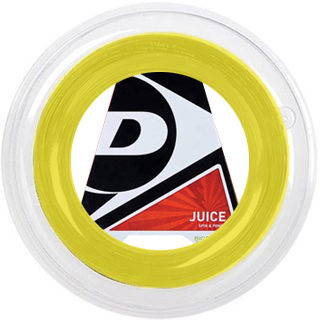DUNLOP JUICE 16 gauge Tennis String
September 22nd, 2011
Dunlop has introduced some new tennis products recently, including a variety of tennis strings. One of those strings, “Juice”, was made available to me by the folks at “DO IT TENNIS” for a play-test. Dunlop Juice is a premium mono-filament polyester string with a pentagonal profile.
I used a 100” 22mm beam racquet for this test (player’s racquet, head-light, flexible). I strung the racquet at 53 lbs. using a 2-piece stringing method (not hybrid).
Here are the results after about 15 hours of hitting…
MARKETING
Dunlop promotes Juice16 as a “spin & control” string and it is part of their “Biomimetic” series of products (engineering inspired by nature). Dunlop rates Juice highly for Power, Spin, and Durability. They rate it as moderate in Comfort. The packaging, which says the string is made in Germany, is rather unique—an open sleeve with the string secured via cable-ties. I liked this packaging idea—I could feel the string, while still unopened—and that told me a lot before I ever hit with it! I could tell that it displayed the normal “poly” characteristics, i.e., stiff, smooth, and apparently strong.
STRINGING
Dunlop Juice was a bit easier to string than many other polyester strings. It displayed almost no coil-memory and was not very prone to tangles. The cross-strings were a little more difficult due to it’s pentagonal shape—they tended to create friction when weaving (but no big deal).
GROUNDSTROKES/SPIN
I was anticipating a very stiff stringbed—even at the 53 lbs. I selected. I was correct—Juice lets you know, right away, that you are in a “contact” sport (ball vs. racquet). The shock-level was immediately apparent (I normally use a multi-filament nylon string). But the good news was that I could really swing hard and maintain control. And when I hit against a very hard incoming ball I sensed that Juice allowed incredible accuracy.
I was very impressed with the level of spin produced. The pentagonal shape must bite the ball a bit more and the poly construction, again, allowed me to hit harder.
VOLLEY
Volleys with Juice were solid and accurate, but I had to use very good form to get any real power.
SERVES & OVERHEADS
Juice enabled me to deliver moderate paced serves with very good placement. Second serves (slice or kick) were very good due to the string construction. And I always felt in control on overheads.
TOUCH
Dunlop Juice, for me, was a bit lacking in the “touch” department. It’s stiffness never allowed me to have much “feel” of the ball sitting on the strings. I was able, however, to hit effective drop-shots.
COMFORT
Juice is designed as a “power” string for big hitters, and this causes the comfort level to lessen. Yes—you can really smack the ball and it stays “in”. But if you have any history of arm problems you better have the ice ready after the match!
SUMMARY
Dunlop Juice performed pretty much as I anticipated—it is a stiff string that allows you hit from baseline to baseline with accuracy, and if appropriate, a huge amount of spin. It is durable, the strings don’t move, and it is easier to string than some other similar strings.
I would suggest this string as proper for players with full strokes and no history of arm or shoulder issues.
Do you have a question for Greg about string or stringing? Leave your comment below and check back next week for the answer.
If you enjoyed this article, here are some others you may enjoy..



